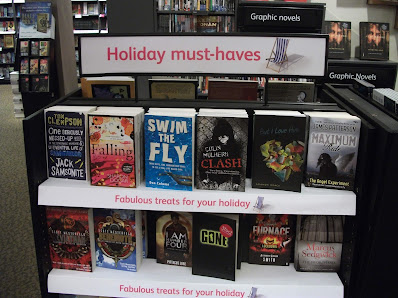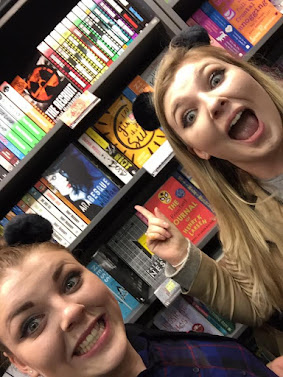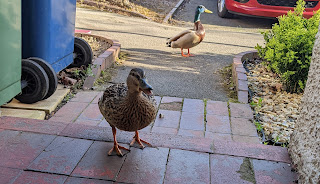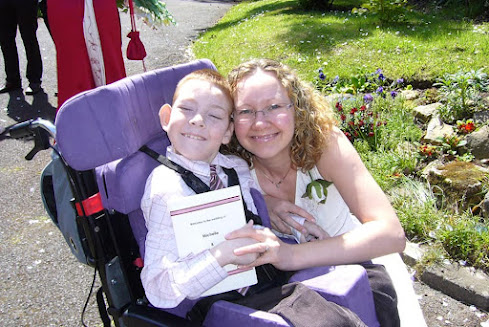Tuesday, 23 August 2022
Writing on a Chromebook
Monday, 22 August 2022
Veggie Challenge
It all began with a duck.
Two ducks, actually. They appeared in the middle of a housing estate and were waddling about outside my front door. I went out to get a photo and they were really friendly. They were curious too. This messed with my mind a little. I mean, ducks with personalities. You can’t eat something that’s friendly. That's just not right.But the ducks flew away and I got over them. Well, kind of. But then last week, we were on holiday in Scotland with a farm right next to us. Our back garden looked out on a field full of cows. The cows had calves. They were friendly too, and curious. They kept coming over to see how we were getting on then skipping about the place exactly like cows don’t.
Suddenly, I felt a bit guilty about the huge block of minced beef I’d bought for bolognese.
The thing is, I've never had much success when I've tried going veggie before. I usually fail when it comes to ordering take-away or going into a pub for something to eat. But this happened in the middle of a sober challenge that was going insanely well. I had the daft idea of doing Dry January in the summer, simply because it's more of a challenge that way, but I was so bowled over by the changes during the first month that I kept going. I ended up doing 72 days and the benefits are amazing. I lost two stone in weight, sorted out a whole load of mental health issues, blood pressure is firmly within the healthy bracket, my productivity went through the roof and I was reading more. I only broke my sober streak to see if I missed it as much as I thought. That was another shock. I was surprised to find that I couldn’t bear the taste of lager or wine. I also hated the feeling of being drunk. Something I thought I loved.
So I’m doing that challenge again. This time I want to let it roll and just see how long I can go. 90 days is the first marker. But, as it's Day 1, it seems a good idea to do a Veggie Challenge at the same time and with the same mindset - to see what the health benefits are. Why not? So I thought I'd kick off with breakfast.
Let's just say it's not a good start.
Yesterday, not realising I was about to do a Veggie Challenge, I bought a load of bacon to go with the black pudding and sausages that are already in the fridge. Unfortunately, those aren't ideal foods for a wannabe Veggie, but I was all fired up for a cooked breakfast. However, thanks to my morality wobble with the cows, I have some plant-based sausages in the freezer.
I got them out and stuck them in the oven. Twenty minutes later, they’re ready to go. Here they are, on brown bread with a squirt of tomato sauce and a side order of black coffee.
Mmmmm.... Tasty eh?
Not exactly. They tasted bloody awful. The pack says they're made from peas. The experience is like eating Weetabix-flavoured cardboard.
Besides, what is the point of veggie sausages? I get veggie fingers, because they're colourful and taste like they sound, but are veggie sausages meant to mimic pork? Does that mean there's some Quality Assurance guy eating both to make sure they do? So Porky Pig is being slaughtered regardless? There's something not quite right about that. I'm not sure that meat substitutes are the way to go.
Time to go shopping.
Saturday, 25 June 2022
Traditional vs Self Publishing: my personal experience so far
I first decided to make writing a career when I realised that my son’s disability meant he would always need someone at home. It didn’t seem fair that my wife would never be able to return to nursing, so in 2003 we swapped roles. I became Matthew’s full time carer, wrote when he was at school and began submitting book after book.
 |
| image c/o seatletimes.com |
 |
| A first look at our new council house. Image: Colin Mulhern |
Promotion
The publisher offered a promotional package that included a London book launch, a professionally produced YouTube trailer, press releases, newspaper reviews and an ebook version – this was the early days of Kindle, the ideal time to break into the ebook market.The ebook never came out. I had to create the YouTube trailer, organise my own book launch, sort out school and library visits and contact local press.
Money
The money was dire, but I had a foot on the ladder. Book 2 did rather well. It sold international rights and made it to the final three for a major YA competition. Book 3 was due for release in 2015. My career was going great, right?Wrong. There was no more money, the publisher cut all ties and my agent retired.
Moving on
Hitting the floor
In 2015, when Matthew was sixteen, his disability got the better of him. Grief took over our lives and the world stopped.After a long break, I set out to write something completely new, something for the younger end of the children's market that Matthew would have liked. My agent wasn't confident about the book or that end of the market, so we split on good terms and I set about finding a publisher myself. I got an offer of a deal just three days after sending the manuscript out.
I was devastated. I had failed in making a better life for Matthew when he was alive, and now I’d failed in doing something in his memory. The traditional world of publishing had led to frustration, misery and depression.
But there was another option...
A brave new world
I decided to dip my toe into the world of Indie Publishing (a fancy name for Self Publishing). Despite the stigma, it's a whole lot of fun. I found the whole process to be quick, simple and very enjoyable. It also meant I could write whatever I liked. So I wrote another children's book, a gothic horror for adults and a rom-com. It was like I'd found a toy shop and was playing with everything I could get my hands on. I was having a blast, but I was also a bit blinded by the Indie success stories.Indie Giants
 |
| L.J.Ross Image:BBC News |
Is it really the promised land?
What kind of writer do you want to be?
Final thoughts
 |
| CLASH in my first in-store display. |
 |
| A Facebook friend found Arabesque! |
Thursday, 3 March 2022
How to write like a pro: the secret formula your writing coach won't teach you.
 |
| Image c/o Dean Wesley Smith |
Heinlein’s Rules
- You must write.
- You must finish what you start.
- You must refrain from rewriting except to editorial order.
- You must put it on the market.
- You must keep it on the market until sold.
Do the rules actually work?
In 1981, Dean Wesley Smith was on the cusp of giving up on his dream to be a writer when he chanced upon Heinlein’s Rules. Having nothing to lose, he decided to follow them to the letter. He went from being unable to sell anything to becoming a multiple-times New York Times bestseller. He currently has over 200 novels to his name and is in demand as a ghost writer because he writes fast and delivers on deadlines.Treat your writing as a business.
Have you ever heard of a plumber with plumber’s block? Or a builder who can only lay bricks when the muse takes him? What about a car mechanic who has to find the right mental zone before attempting an oil change? This is essentially what Heinlein’s first rule is about. You have a job, so get to work. You must write.
Avoid distractions
For novelists, there is a point around the one-third mark when the honeymoon phase ends and the hard work begins. In his regular YouTube show, Author Level Up, Michael La Ronn gives advice about tackling the dreaded one-third mark and how he, after thirty-seven novels, still experiences that moment in every novel he writes. The only practical solution is to work through it: you must finish what you start.Refrain from rewriting.
Put Your Work on the market.
Don’t worry that people won’t like it. Even the best of the best get one star reviews. It’s called taste. Besides, your book already has one fan... You!Don’t treat publishing as a lottery. Be strategic. Don’t send a slasher horror to a children’s publisher, or a Minecraft strategy guide to a romance publisher. If you are targeting agents, the same applies – visit their website, find out who they represent and what they want.
Keep it on the market until sold.
So you sent it out and it got rejected. Welcome to the club. You’re in good company.- Carrie by Stephen King - 30 rejections.
- Dune by Frank Herbert - 23 rejections.
- Catch 22 by Joseph Heller - 22 rejections.
- Lord of the Flies by William Golding - 21 Rejections.
What if there’s nowhere else to send it?
Day 7 - Sidestepping
After having Sunday off, I gave both WIPs some thought and decided it's worth switching to the romcom for the rest of the month. This w...
-
I've been playing with a budget Chromebook for the past few months and have to say, a Chromebook is a pretty good choice for writing. I...
-
Thursday 3rd March was one of the craziest nights of my life. Rather than launch the book in a shop or library, I booked a theatre and got ...
-
I took a long break from writing at the start of the year. The second Buttercup book had been put back to September, there were no plans for...

_KV-2560.jpg)





_KV-2560.jpg)

